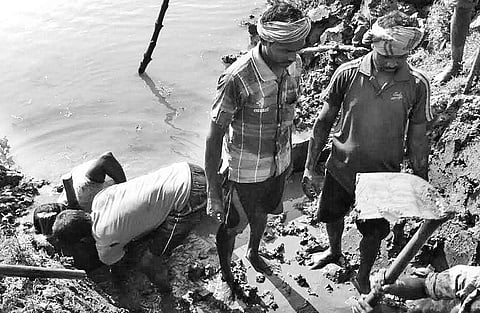

KENDRAPARA: Illegal shrimp cultivation in the Protected Reserve Forest (PRF) of Bhitarkanika National Park has affected fertility of land. The saline-affected agricultural land has turned barren. The farmers, who have to battle frequent natural disasters, are at their wits’ end on ways to fight this man-made menace.
Hundreds of farmers of Sanatubi, Badatubi, Batighar and other seaside villages under Mahakalapada forest range blame it on seepage of water containing chemicals and discharge of effluents into fertile agricultural lands. “Nothing hurts me more than watching our villages lose their mangrove cover and agricultural land to the illegal activities of prawn mafia,” said Arjun Mandal of Batighar village.
A large number of farmers complain of white patches on top soil and gradual loss of fertility. The farmers attribute it to existence of large number of prawn farms which have been set up in violation of Coastal Regulation Zone (CRZ) and Supreme Court and High Court rulings on shrimp cultivation, said Amarbara
Biswal, a social worker of Kendrapara.
As almost all shrimp farms are illegal, the district administration and forest officials demolished around 250 acres of illegal prawn gheries in PRF. “The authorities, under police protection, demolished around 250 acres of illegal shrimp farms over forest land on Thursday. We will raise mangrove trees over the demolished prawn farms to prevent the mafia from converting forest land into prawn farms”, said Bijaya Parida, range officer of Mahakalapada forest range.
Parida said farmers cultivating shrimps without registering with Coastal Aquaculture Authority (CAA) are liable to be imprisoned for three years and fined up to `one lakh. It was mandatory for all shrimp farms to be registered under provisions of Coastal Aquaculture Authority Act (AAA) and Rules, 2005. The AAA requires registration of all shrimp farms lying on either side of rivers, creeks and canals up to a distance of 5 km from high tide level. Unregistered shrimp farms are liable for demolition, he added.
Last year, the Union Ministry of Environment and Forests (MoEF) declared 192 villages around Bhitarkanika National Park as Eco-Sensitive Zones (ESZs) to protect these from ecological damage. ESZ prohibits any shrimp farming within 2 km from Bhitarkanika, the officer added.